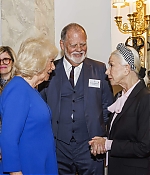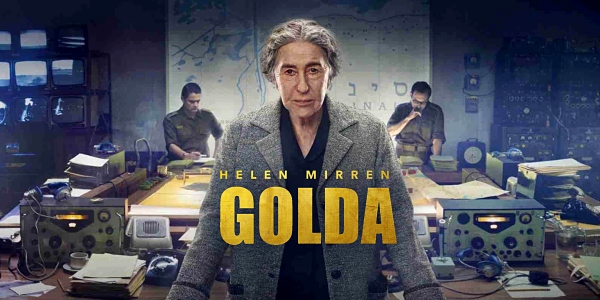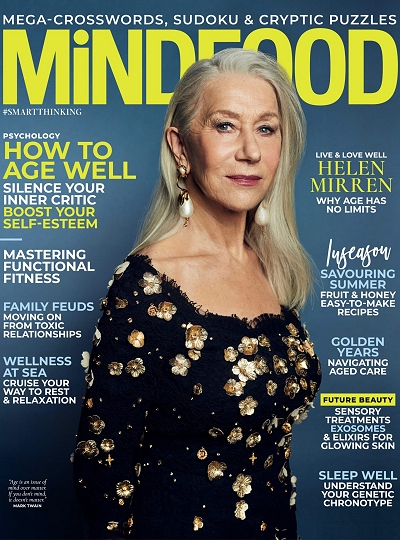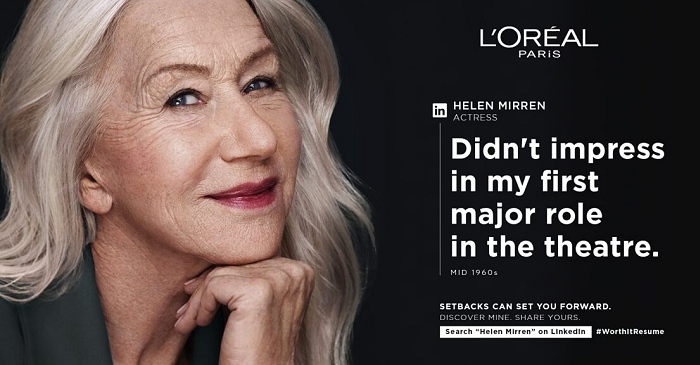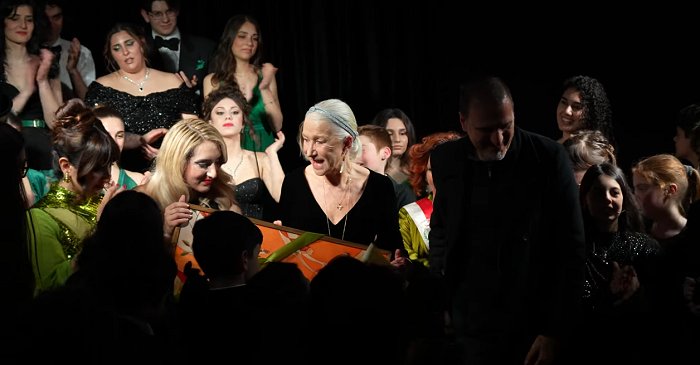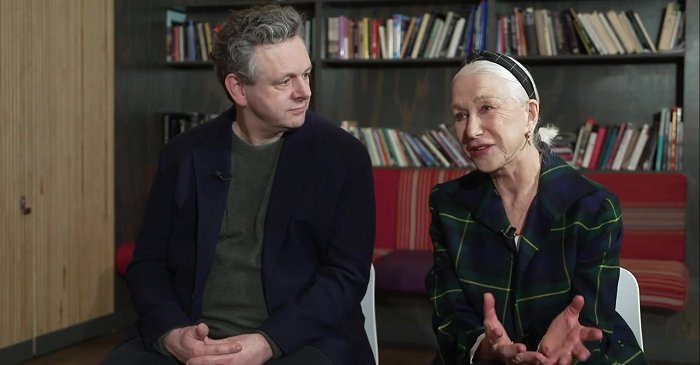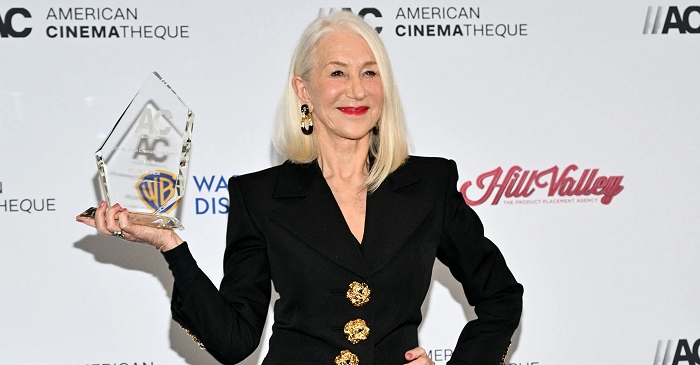
|
Welcome to The Helen Mirren Archives, your premiere web resource on the British actress. Best known for her performances with the Royal Shakespeare Company, "Prime
Suspect" and her Oscar-winning role in "The Queen", Helen Mirren is one of the world's most eminent actors today. This unofficial fansite provides you with all latest
news, photos and videos on her past and present projects. Enjoy your stay.
|
Celebrating
10 years
on the web
|
Her femme fatale reputation is unshakeable, but Emmy award winner Helen Mirren claims not to understand what all the fuss is about – it’s growing older that makes us shed our inhibitions, she tells Simon Hattenstone
It takes us a good 30 seconds to get on to sex. Helen Mirren’s wearing a plaster on her toe. I’ve got a thing about plasters, I say. “That’s a strange fetish,” she answers, po-faced as the Queen, whom she plays quite brilliantly in the new Stephen Frears’ film of the same name. I didn’t mean it like that. It came out wrong. What I meant was, I use lots of plasters and they never seem to stick properly for me, but it’s too late. We are heading down double-entendre alley. We are in a London penthouse suite, very stylish, very cool. Mirren opens a trap door and is peering through a strange hole in the floor leading down to a room below. I’m half expecting the fire service to appear. “This would be a great place for a romantic weekend, wouldn’t it?” she purrs approvingly. When we set up this interview, Dame Helen made one request – that the interviewer be a man. She enjoys the company of men. I have a feeling that she enjoys toying with men. Years ago she said in one of those A Day In The Life-style columns that she always puts her alarm on early so she can make love to her man first thing in the morning. It’s a story people love to repeat, especially men – and one that has come to define Mirren. (What people tend to forget in telling the story is one of the reasons she gave for the early start – that they were so often separated from each other for work reasons.) Perhaps it’s inevitable that we dispense with the small talk and move on to sex and emotional truths so quickly. Mirren has rarely played characters who do small talk. Take her two latest roles. She is magnificent both in her reprisal of Superintendent Jane Tennison after a three-year absence, in the final Prime Suspect, and as Queen Elizabeth, normally a master of the pleasantry, no doubt, but here with her back to the wall, doing battle with Tony Blair just after Diana’s death in The Queen. He is all for flags at half-mast and visible emotion, she for decent reticence and seclusion at Balmoral.
The physical transformation is astonishing – it’s a wonderful impersonation – but what makes it all the more impressive is that she seems to add a new dimension to what we know about the Queen. She suggests so much while saying so little – anger, desperation, snobbery, loneliness, humour – all through the tiniest movements of a tight-lipped mouth. Mirren has often portrayed women of rare strength – manly strength, despite her very womanly glamour. Early on, this power was often expressed through her sexuality – Mirren was not made for soppiness or simpering or obeisance. In recent years, the power has tended to express itself through her characters’ work, whether as Queen Elizabeth I in the TV series (for which she this week won a Best Actress Emmy), as Queen Elizabeth II or as Tennison. Tennison is one of the great characters in television drama, a whisky-drinking, chain-smoking leader of men. The only way she can succeed in a police force and a society that doesn’t trust women coppers, let alone powerful women coppers, is by out-machoing the men. But, like all great characters, she is awash with ambiguities. In the new Prime Suspect, Tennison is facing up to retirement. Her bob is now silver-blond, she is drinking on the job, and she’s (rightly) still paranoid about being undermined. Mirren says she never really studied for the role, it came easy. Part, at least, must have come from her own life experiences – to an extent she could be playing any professional, high-achieving woman of her generation, trying to exist on equal terms in a man’s world.
In recent years, she has also played dour (the pinched housekeeper in Gosford Park), desperate (the mother of a hunger striker in Some Mother’s Son) and blowsy (Julie Walters’ friend in Calendar Girls) but she remains best known for sex and power. No British actor has ever done sex quite like Helen Mirren. Right from her film debut in Michael Powell’s Age Of Consent, in 1969, playing a young muse of uncertain age, through to the much-derided shagathon Caligula, Lindsay Anderson’s O Lucky Man! and Peter Greenaway’s The Cook, The Thief, His Wife & Her Lover, her performances have been charged with an extraordinary sensuality. Around 25 years ago I saw her at the Royal Exchange in Webster’s The Duchess Of Malfi. I’d never seen anything like it; she burned up the stage with desire and desperation. There often seemed to be an ambiguous element to her early performances, verging on the sado-masochistic – part dominatrix, part submissive; dirty and aloof; vulnerable and invincible; cold and raging, all at the same time.
I’m trying to express some of this to her, and she’s getting impatient. She claims she doesn’t understand the sex thing. “I’ve never seen it,” she says tersely. “I appreciate beauty, and I know I’m not beautiful, so I know it’s not to do with that. I appreciate overt gorgeousness, sexiness – Marilyn Monroe type of thing – and I know I’m not that, so I don’t see it and I don’t get it, but it’s been around me long enough…” Why does she think directors so often have her play women who can destroy men with a single superior sniff? “I’ve always felt more the person being destroyed than the destroyer,” she says, quietly – and there’s a silence. “I think you’re really looking at it from a male point of view,” she says, in a severe voice. “You see it as sexual – pissing and shitting and doing whatever you have to do, but you guys looking go, ‘Oh God, that’s sexy’. We don’t see that or even feel it or even really think about it…” She appears to change her mind even as she’s talking. “…I mean, some of us do, and some of us use it, because it is a weapon of enormous power that you have for a fairly brief period in your life. You are aware of sexuality as a young creature from everyone else looking at you…” She trails off. Mirren, now 61, was born Ilynea Lydia Mironoff and comes from an unusual background. Her paternal grandfather, a Russian noble and diplomat, was negotiating an arms deal in England and found himself stranded there, along with his family, after the Russian Revolution. Mirren’s parents worked together in a fabrics shop in Ilford, Essex. Her mother came from a family of butchers. Her father, a cabbie-turned-chief traffic examiner, fought Mosley’s Black Shirts in the East End, and defined himself as a socialist. She describes her family as poor middle class – working-class money, middle-class attitudes. Mirren herself has long been associated with the liberal-left and has added her voice to any number of causes – against the arms trade, against the military dictatorship in Burma, on behalf of the war-torn children of Uganda. She has even campaigned for the Stilton Cheesemakers’ Association to help raise awareness of osteoporosis. In 1997, she championed Tony Blair’s Labour, and stands by the party’s achievements. “It would be terrible if we still had that same old Conservative government, wouldn’t it – if we were still back where we were then?”
After leaving school, she studied speech and drama, and expected to live a sensible, modest life as a teacher. But by the age of 20 she was working with the Royal Shakespeare Company and living it up in the newly permissive world, one of the most glamorous girls on an already glamorous scene.
She seemed representative of the newly-liberated woman – gorgeous, uninhibited, independent minded and independent living. She didn’t join feminist groups, didn’t even define herself as a feminist, even though looking back she knows she was and is one. Now she understands how much she owes to those whose campaigning work allowed her to embrace the newly-won freedoms. “I didn’t realise at the time that you had to be this loud, annoying, tub-thumping organisation to get anything done.” The most important thing her parents taught her was not to rely on a man for her living. “You know, the greatest gift every girl can have is economic independence.” In one of her first interviews, in 1968, when preparing to play Cressida in Troilus And Cressida, she described herself as massively ambitious. “All my ambitions are based on jealousy. When I was a little girl and went to the theatre, I was always jealous of that girl on the stage. Now I’m jealous of people who can do as well as me.” At the same time, she told the Daily Mail, “When I was a little girl I vowed that when I made it, I wouldn’t be just good. I wouldn’t be just brilliant. I would be the greatest thing there ever was.” She was gobby and political, going on to stand unsuccessfully as a Workers’ Revolutionary Party candidate for elections to the council of Equity, the actors’ union. She thought she was unlikely to marry or have children, and in 1974 she said she could not see herself becoming one of those theatrical dames. “All that getting sanctioned by authority, settling down and doing the right things… well, I can’t say it appeals much. What I really fancy is getting a bit notorious.” She says now that she was never as confident of herself as she appeared; she was shy and, despite herself, always looked to men for support. “I was very uncertain. I had panic attacks. In my job you have to meet people constantly and deal with people you don’t know. It was very difficult on the first day’s rehearsal having to walk in… And what you call sexuality often had to do with just the fact of blond hair and big tits and absolutely nothing else.”
They’re not that big! “No, actually. But you know that package. Plonk! It’s on you, and you can’t wriggle out of it… I’m not saying I didn’t enjoy it as well…” Mirren seems to be wrestling with herself. “It’s very boring, sexuality,” she says, decisively drawing a line under the topic. No, it’s not, I say. Yes, it is, she says. “Well, it’s quite interesting,” she concedes, then she smiles. “I lived with a very great photographer for four years of my life. He was called James Wedge. He experimented with sexuality. He used images of sexuality, or sexuality itself, or whatever it is. We did that, we worked together, did photographic work together. I wasn’t averse. I wasn’t being prim. I didn’t feel I should have to be; I felt I should be able to be whatever I was inside myself without this other thing being imposed on me from the outside. And the thing that was imposed on me from outside was crude and vulgar and distressing to me, and disturbing – that big tits, blond hair, Diana Dors, blowsy kind of thing. Whereas I was interested in sexuality and fetishism and all kinds of stuff. But in a really different way. I think Madonna got it right. Madonna claimed it for herself, and I’ve always admired her for that. I loved that sex book she did, I thought it was fantastic, because it was a big two fingers up. ‘This is my sexuality, it’s not what you put on me, it’s mine.’ ”
For her part, Mirren has appeared naked more often than any mainstream actress of her generation – for her 50th birthday she appeared tastefully naked on the cover of the Radio Times, and you could imagine her doing it again for her 70th – but perhaps she thinks she did it on established showbiz terms (from “top bird” to “game old bird”) rather than her own. Yes, she has been pretty uncompromising, but perhaps not quite as uncompromising as she would like to have been. It is this tension that has always made her interesting. If she had been totally at ease with herself, maybe she would have done a Madonna – maybe the Wedge pictures would have been published. It was never easy being true to yourself when others were so keen to pigeonhole you, she says. “I was enraged by the sexism I encountered, exacerbated by the way I looked. If I’d looked like a dark, little intellectual person… I didn’t like how I looked at all, but you have to live with it, and you have to love it.” How would she like to have looked? “Well, obviously, ideally I’d have long and beautiful legs. I have short, fat legs.” We compare legs. I tell her I’ve got Ernie Wise legs. She demurs. Her legs look fine to me. (But in The Queen she really does make the most – or least – of them, sensibly shod, slightly splay-footed.) So, the ideal? “Possibly a different thing every day. The left-bank bohemian look, flat-chested, long, dark hair – always thin legs, though, always. Then another day, tall, tall… you know, gorgeous.”
As a young actor, she turned up at all the parties, but she hated them, she says, didn’t know what to do with herself. And she had some terrible experiences with men. I read that she had been date-raped, more than once, when she was young. She gets up off her seat to fetch some water, and answers with her back to me. “Yeah, but I don’t want to talk about that, though.” Her unease in the early years, she thinks, explains the pattern of her subsequent life. “I was a serial monogamist, really. To be out in the world, dating, or whatever it is, was not a comfortable place to me, so I had a series of really great relationships. The men I was with were all fantastic.” Former partners include Wedge, and actors Liam Neeson and Nicol Williamson. Mirren finally married film-maker Taylor Hackford in 1997, after more than 10 years together. Yes, she says, they did wed largely for tax reasons but, yes, she also considers herself a romantic. Is her husband a romantic? “Oh, no.” If he’s not a romantic, what does she get from him? “What I get on the other side is so much better. Loyalty and truthfulness and, you know, manliness in the proper sense. I’d take those qualities over a romantic evening with a bullshitter any time.” Hackford, whose films include Ray and An Officer And A Gentleman, has two children, now grown up. Mirren says she has never had maternal longings, and always felt like a friend to them. Sometimes they now refer to her as their stepmother, and it freaks her. “It’s not a phrase I recognise – I was never very motherly towards them… People don’t need more than one mum unless their mother is deficient, and neither of their mothers was. Both had great mothers, really.”
By now she’s talking in a more laid-back way – uninhibited, girlish and boyish at the same time. All the men in her life have been such different characters, she says, except for one thing – their love of boxing. And they converted her. “A great boxing match is a pretty amazing thing to see… the excitement of the big matches. A couple of times I’ve been in Las Vegas. We went up to Manchester to see Naz fight and that was incredible.”
I ask her how she feels about Prince Naseem being in prison – he left the scene after a terrible traffic accident. She sounds shocked. “He’s in prison? What for? Tax evasion?” I explain what he did. “I didn’t know that. Oh, he was so beautiful, he was such a beautiful boxer. And it seems such a short time ago.” I tell her he got two years (in fact, it was 15 months). “Fuck!” she shouts. “I’m going to write to him.” Did she ever box? “No! Now it would be a possibility to see girls boxing and playing football. I would have been a very good footballer.” Why? Stupid question, really. “I’ve got footballers’ legs. They’re strong, I love kicking.” And she never played? “Well, no, of course not. Girls were literally not allowed to play football. And how fucking outrageous is that, excuse me! To say, girls – or any human category – no, you can’t do that. Why? It was against the law. I remember there was a school team and they had one girl because she was the best player in the school on the team and the Football Association said no, she can’t … it makes me so angry.” At this point I’m remembering she’s a dame. “Can I call you Dame Hell?” I interject.
She laughs. “Yes, it’s rather good, Dame Hell, I like that. Only my best friends call me Hell, though, Simon. I’m not quite sure that we can categorise you as that… Maybe one day…” She doesn’t like being called Dame, either. The other day she was on the bus and somebody offered her a seat. “I said, thank you so much, and sat down, but I was mortified, actually. Mortified.” Did he recognise her? “No, he didn’t recognise me. He then just turned his back on me and ignored me.” Ah well, she says, there are worse things, and it was nice to get the seat. She takes setbacks more in her stride these days. She feels more at ease with herself. Looking at her now, I can’t help thinking of Tennison in the last Prime Suspect. They have both been through so many battles – assertive women, plagued by doubts, making their way through life. But whereas Tennison seems exhausted and beaten, Mirren is vibrant and optimistic; whereas Tennison’s powers are on the wane, Mirren’s are peaking.
She looks back to the time she appeared to have everything, and reckons she was a mess of confusions. “Your twenties are torture, really, because you don’t know what you are going to be or whether it’s all going to work out, and you are supposedly an adult but you haven’t really learnt anything. You’re always looking for your own place in the world, but you’re insecure – you think you’re wonderful one minute and you think you’re a disaster the next. I think your thirties are a wonderful time.” And her sixties? “It’s brilliant, really, the way life organises itself, because you just slowly get used to what you are, don’t you?”
The Queen goes on release on September 15. Prime Suspect 7 will be on ITV1 in October.

